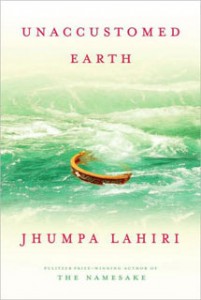Posts Tagged‘Fiction’
Thursday’s Work-in-Progress: Listening Like a Writer
Spend long enough in writing circles, and you hear (and talk) a lot about “reading like a writer.” You might even write a book on the subject.
But we spend far less time discussing “listening as writer.” But after attending a reading this week at Baruch College of The City University of New York, that’s exactly what’s on my mind.
The reading was given by Jhumpa Lahiri, who is this semester’s Sidney Harman Writer-in-Residence. The (large) room was packed. I’ve rarely (ever?) encountered readings this large outside AWP or similar conference settings.
And it was free.
 Lahiri read from work old and new. She began with an excerpt from “Hell-Heaven,” one of the stories in her collection Unaccustomed Earth.
Lahiri read from work old and new. She began with an excerpt from “Hell-Heaven,” one of the stories in her collection Unaccustomed Earth.
As I listened to passages like this one…
He was from a wealthy family in Calcutta and had never had to do so much as pour himself a glass of water before moving to America, to study engineering at M.I.T. Life as a graduate student in Boston was a cruel shock, and in his first month he lost nearly twenty pounds. He had arrived in January, in the middle of a snowstorm, and at the end of a week he had packed his bags and gone to Logan, prepared to abandon the opportunity he’d worked toward all his life, only to change his mind at the last minute. He was living on Trowbridge Street in the home of a divorced woman with two young children who were always screaming and crying. He rented a room in the attic and was permitted to use the kitchen only at specified times of the day, and instructed always to wipe down the stove with Windex and a sponge.
…I was reminded of a feeling that I’d had reading certain Alice Munro stories. In awe, of course. But also thinking back to what I’d been taught by so many writing lessons. And thinking: She is “telling” at least as much as she is “showing”! This is not “in-scene.” There is no dialogue! Exposition is allowed! It can be done, and it can be done beautifully!
This was especially encouraging to me because only two days earlier I had (finally!) submitted my first commissioned short story.
I’m aware that there is significant telling in that story. There is not-inconsiderable exposition.
I haven’t yet received a response to let me know if it is what the commissioner was looking for. So of course, I’m still worried.
But on Tuesday evening, listening to Jhumpa Lahiri read aloud from a story I’d already read silently more than once, I heard something reassuring. Something important.
And that is because I was listening in a special way: as a writer.
The Wednesday Web Browser for Writers
Quotation of the Week: Stephen King
“Fiction is a lie, and good fiction is the truth inside the lie.”
–Stephen King
Source: As I noted last week, I’m currently enjoying the latest Southeast Review Writing Regimen, and this quotation was included in one of the regimen emails.